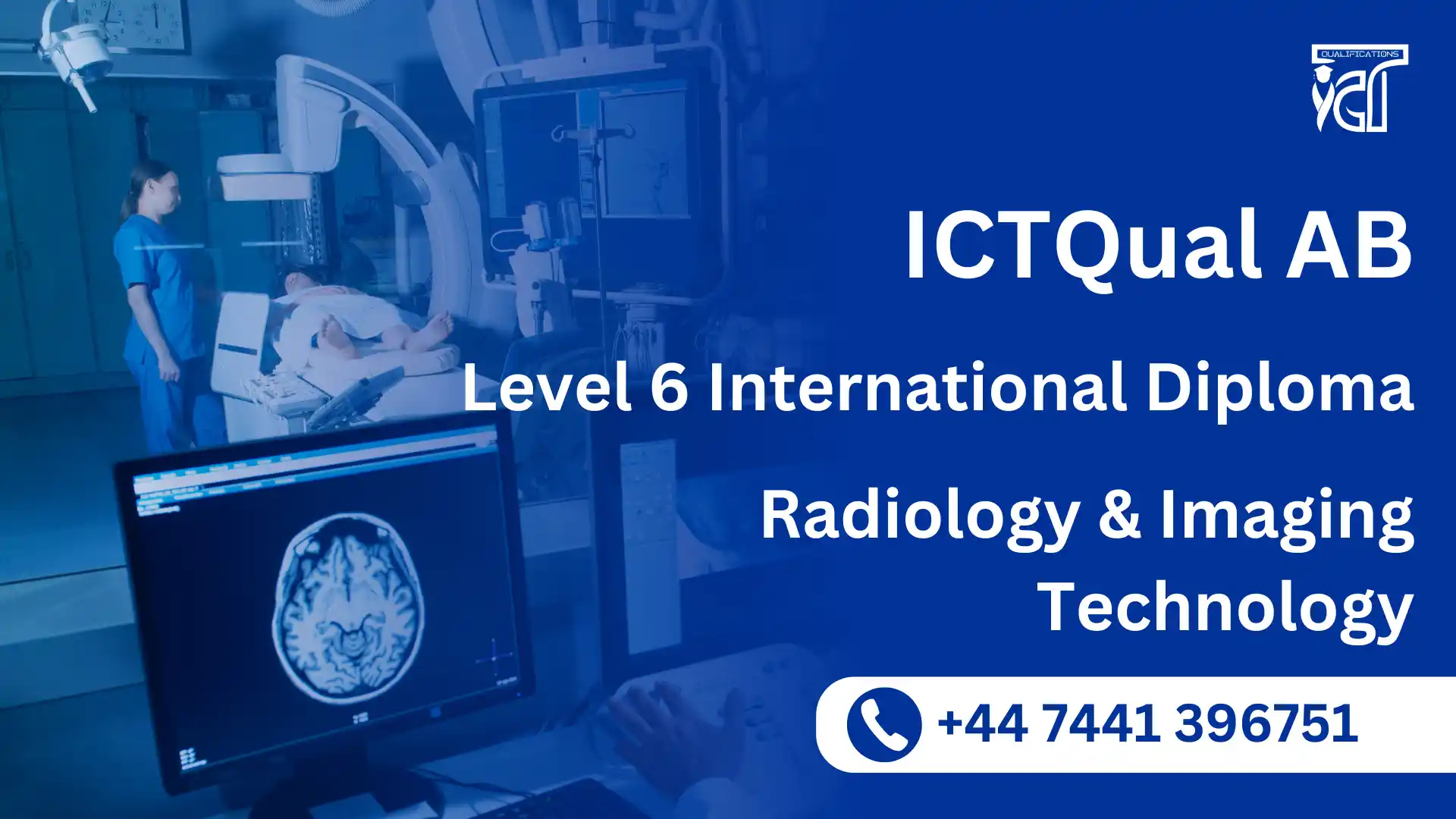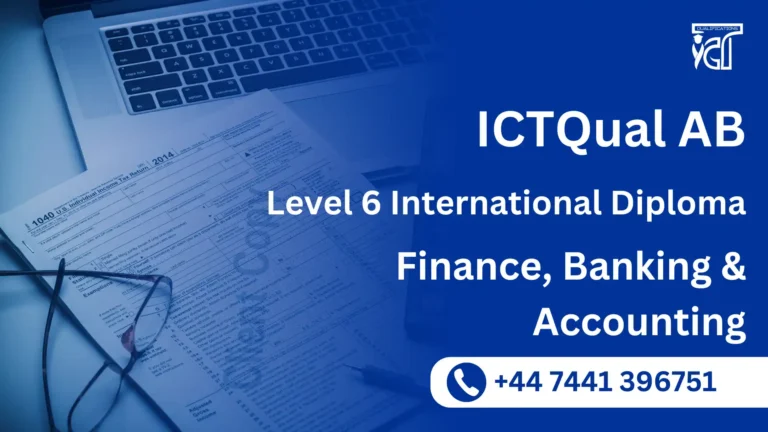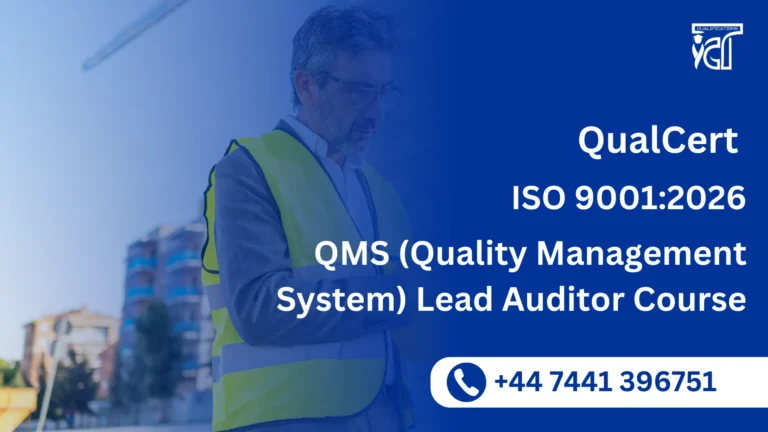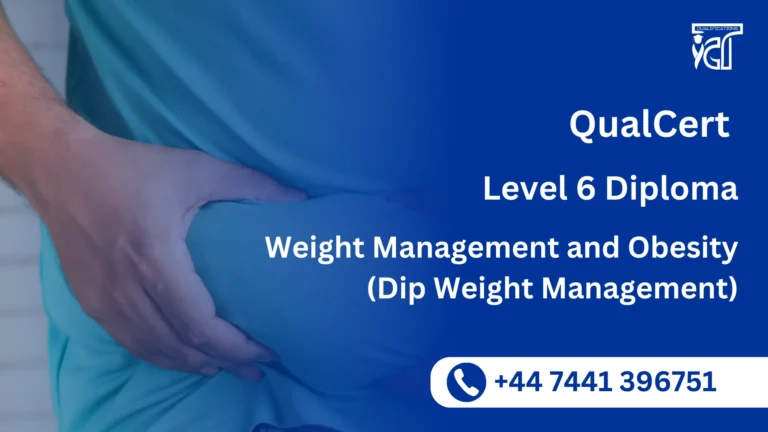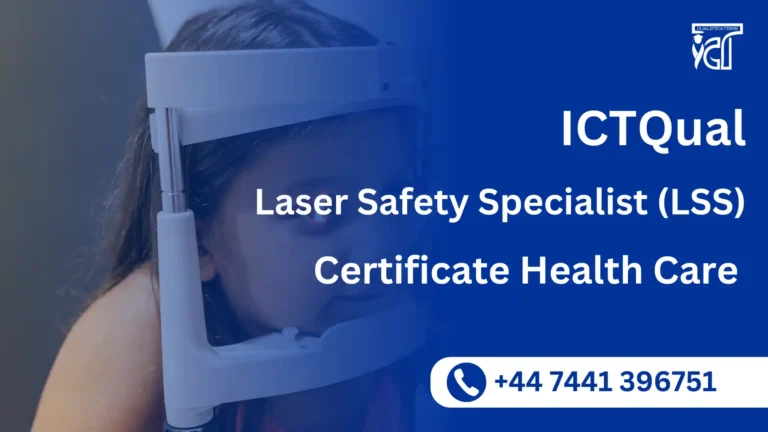The ICTQual AB Level 6 International Diploma in Radiology & Imaging Technology is a comprehensive programme tailored for learners who aspire to excel in the fast-evolving field of medical imaging. Whether you are a fresh learner starting your journey or a healthcare professional seeking advanced expertise, the ICTQual AB Level 6 International Diploma in Radiology & Imaging Technology delivers the technical knowledge and applied skills demanded by modern healthcare systems.
Spanning three years and structured around 360 credits, the course provides in-depth training in radiographic procedures, imaging technology, diagnostic techniques, and radiation safety. Learners will gain proficiency in using advanced imaging equipment, interpreting diagnostic images, and supporting clinical teams to make accurate and timely healthcare decisions.
The ICTQual AB Level 6 International Diploma in Radiology & Imaging Technology prepares learners for high-demand roles such as Radiology Technologist, Imaging Specialist, or Diagnostic Technician in hospitals, diagnostic centres, and specialised healthcare facilities. The curriculum also emphasises critical thinking, patient care, and ethical practice, ensuring graduates are not only technically skilled but also compassionate and professional in their approach.
Key outcomes include mastering radiographic technologies, understanding anatomy and pathology through imaging, and applying international best practices in diagnostic radiology. By combining theory with practical application, the ICTQual AB Level 6 International Diploma in Radiology & Imaging Technology positions learners for success in competitive job markets and provides a strong foundation for further academic progression or specialist certifications.
The ICTQual AB Level 6 International Diploma in Radiology & Imaging Technology empowers learners to become competent, adaptable, and industry-ready professionals—making it an ideal choice for those passionate about contributing to high-quality patient care and advancing their careers in radiology and imaging technology worldwide.
ICTQual AB Level 6 International Diploma in Radiology & Imaging Technology
This qualification, the ICTQual AB Level 6 International Diploma in Radiology & Imaging Technology 360 Credits – Three Years, consists of 36 mandatory units.
Year 1: Foundation in Radiology & Imaging Technology
- Introduction to Radiology and Imaging Sciences
- Human Anatomy and Physiology for Imaging
- Principles of Physics in Medical Imaging
- Fundamentals of Radiographic Techniques
- Radiation Safety and Protection
- Introduction to Medical Imaging Modalities
- Patient Care and Communication Skills
- Basic Medical Terminology
- Laboratory Safety and Quality Assurance
- Introduction to Imaging Equipment Operation
- Medical Ethics and Professional Conduct
- Research Methods in Healthcare
Year 2: Intermediate Radiology Applications
- Advanced Radiographic Techniques
- Computed Tomography (CT) Imaging
- Magnetic Resonance Imaging (MRI) Principles
- Ultrasound Imaging Fundamentals
- Nuclear Medicine and Radiopharmacy Basics
- Clinical Radiology and Diagnostic Interpretation
- Imaging Informatics and Digital Systems
- Health and Safety in Imaging Departments
- Patient Assessment and Care in Imaging
- Quality Control and Equipment Maintenance
- Applied Research Methods in Imaging
- Leadership and Teamwork in Radiology Practice
Year 3: Advanced Specialisation and Professional Practice
- Advanced MRI and CT Imaging Techniques
- Interventional Radiology Procedures
- Advanced Ultrasound Applications
- Imaging in Oncology and Cardiology
- Radiology Reporting and Interpretation Skills
- Advanced Radiation Protection Practices
- Biomedical Imaging Technology Integration
- Emerging Trends in Radiology and Imaging
- Clinical Placement / Practical Competency
- Capstone Project / Dissertation in Radiology
- Professional Practice and Reflective Development
- Healthcare Management and Policy in Imaging
Learning Outcomes for the Level 6 International Diploma in Radiology & Imaging Technology 360 Credits – Three Years:
Year 1: Foundational Knowledge
By the end of Year 1, learners will be able to:
Introduction to Radiology and Imaging Sciences
- Understand the principles and scope of radiology and medical imaging.
- Identify different imaging modalities and their clinical applications.
- Recognise the role of imaging in patient diagnosis and treatment planning.
Human Anatomy and Physiology for Imaging
- Demonstrate knowledge of human anatomy relevant to imaging procedures.
- Understand physiological processes that affect imaging outcomes.
- Apply anatomical knowledge in interpreting radiographic images.
Principles of Physics in Medical Imaging
- Explain the physical principles underlying imaging modalities.
- Apply concepts of radiation, energy, and wave propagation to imaging technology.
- Understand factors affecting image quality and safety.
Fundamentals of Radiographic Techniques
- Perform basic radiographic procedures under supervision.
- Understand positioning, exposure, and imaging parameters.
- Apply standard protocols for routine diagnostic imaging.
Radiation Safety and Protection
- Apply principles of radiation protection for patients and staff.
- Understand regulatory and legal frameworks in radiation safety.
- Implement safe practices in imaging environments.
Introduction to Medical Imaging Modalities
- Recognise different imaging modalities and their diagnostic purposes.
- Understand the advantages and limitations of each modality.
- Identify indications for modality selection.
Patient Care and Communication Skills
- Demonstrate effective communication with patients and healthcare teams.
- Apply patient-centred care principles during imaging procedures.
- Address patient concerns and ensure comfort and safety.
Basic Medical Terminology
- Use appropriate terminology for radiology and clinical communication.
- Interpret medical terms in imaging reports and documentation.
- Enhance clarity in professional interactions.
Laboratory Safety and Quality Assurance
- Implement safety protocols in imaging laboratories.
- Understand quality assurance procedures for equipment and procedures.
- Monitor and maintain compliance with safety standards.
Introduction to Imaging Equipment Operation
- Operate basic imaging equipment under supervision.
- Understand equipment functionality and maintenance basics.
- Apply standard procedures for equipment setup and usage.
Medical Ethics and Professional Conduct
- Apply ethical principles in clinical and imaging practice.
- Maintain confidentiality and professional behaviour.
- Understand legal responsibilities in patient care and imaging.
Research Methods in Healthcare
- Understand the fundamentals of healthcare research methodology.
- Design simple research projects relevant to imaging.
- Analyse and interpret basic research findings.
Year 2: Intermediate Proficiency
By the end of Year 2, learners will be able to:
Advanced Radiographic Techniques
- Apply advanced positioning and exposure techniques.
- Interpret intermediate-level radiographic images accurately.
- Follow complex imaging protocols in clinical practice.
Computed Tomography (CT) Imaging
- Understand principles and applications of CT imaging.
- Perform CT procedures safely and accurately.
- Evaluate CT images for diagnostic purposes.
Magnetic Resonance Imaging (MRI) Principles
- Explain MRI physics and image formation.
- Conduct MRI procedures following safety guidelines.
- Recognise normal and abnormal imaging findings.
Ultrasound Imaging Fundamentals
- Perform basic ultrasound imaging procedures.
- Understand ultrasound physics and Doppler principles.
- Interpret ultrasound images in clinical contexts.
Nuclear Medicine and Radiopharmacy Basics
- Understand the use of radiopharmaceuticals in imaging.
- Apply safety measures in handling radioactive substances.
- Recognise clinical applications of nuclear medicine techniques.
Clinical Radiology and Diagnostic Interpretation
- Analyse images from multiple modalities for diagnosis.
- Correlate imaging findings with patient history and clinical data.
- Report findings effectively to healthcare teams.
Imaging Informatics and Digital Systems
- Use digital imaging systems, PACS, and EMRs effectively.
- Understand data storage, retrieval, and security in imaging.
- Apply informatics for efficient clinical workflow.
Health and Safety in Imaging Departments
- Implement department-wide safety protocols.
- Monitor and manage hazards in imaging settings.
- Ensure compliance with health and safety regulations.
Patient Assessment and Care in Imaging
- Conduct pre-imaging assessments and screening.
- Provide patient support during complex procedures.
- Address patient needs in high-stress or emergency settings.
Quality Control and Equipment Maintenance
- Perform routine quality control checks on imaging equipment.
- Identify and troubleshoot common equipment issues.
- Ensure optimal performance and compliance with standards.
Applied Research Methods in Imaging
- Design and conduct applied research projects in imaging.
- Collect, analyse, and interpret clinical imaging data.
- Present research findings in written and oral formats.
Leadership and Teamwork in Radiology Practice
- Demonstrate leadership in clinical imaging teams.
- Collaborate effectively with multidisciplinary healthcare teams.
- Develop strategies for efficient workflow and problem-solving.
Year 3: Advanced Specialization and Application
By the end of Year 3, learners will be able to:
Advanced MRI and CT Imaging Techniques
- Conduct advanced imaging procedures with high accuracy.
- Optimise imaging protocols for complex clinical cases.
- Evaluate image quality and adjust techniques as required.
Interventional Radiology Procedures
- Assist in minimally invasive radiology procedures.
- Understand indications, techniques, and patient care requirements.
- Maintain safety standards during interventional procedures.
Advanced Ultrasound Applications
- Perform specialised ultrasound scans (e.g., obstetric, vascular).
- Interpret findings for complex clinical cases.
- Apply advanced imaging protocols and patient positioning.
Imaging in Oncology and Cardiology
- Recognise imaging applications in cancer and heart disease.
- Conduct imaging procedures for oncology and cardiac patients.
- Interpret diagnostic results for clinical decision-making.
Radiology Reporting and Interpretation Skills
- Produce accurate and professional radiology reports.
- Correlate imaging findings with clinical history.
- Communicate findings clearly to healthcare teams.
Advanced Radiation Protection Practices
- Apply advanced techniques to minimise patient and staff exposure.
- Implement safety protocols for high-dose procedures.
- Monitor compliance with regulatory standards.
Biomedical Imaging Technology Integration
- Integrate multiple imaging modalities for diagnosis.
- Understand emerging imaging technologies and applications.
- Apply technology effectively in clinical workflows.
Emerging Trends in Radiology and Imaging
- Stay updated with innovations in imaging technology.
- Analyse emerging trends for potential clinical applications.
- Adapt professional practice to evolving industry standards.
Clinical Placement / Practical Competency
- Gain hands-on experience in hospital or imaging departments.
- Demonstrate practical competence in real-world settings.
- Apply theoretical knowledge to patient care and imaging procedures.
Capstone Project / Dissertation in Radiology
- Conduct an independent research project or case study.
- Analyse data, draw conclusions, and present findings professionally.
- Contribute to the field of radiology through applied research.
Professional Practice and Reflective Development
- Reflect on clinical experiences to enhance professional growth.
- Develop strategies for continuous improvement and lifelong learning.
- Maintain professional standards and ethical conduct.
Healthcare Management and Policy in Imaging
- Understand management principles in radiology departments.
- Apply policy frameworks to improve service delivery.
- Lead initiatives for quality improvement and operational efficiency.
The ICTQual AB Level 6 International Diploma in Radiology & Imaging Technology provides learners with advanced skills and practical expertise to thrive in the healthcare imaging sector. This comprehensive programme combines academic knowledge with hands-on training, preparing learners for rewarding careers and long-term professional growth.
1. Professional Growth and Career Advancement
- Earn a recognised Level 6 qualification valued in healthcare and diagnostic industries worldwide.
- Access opportunities in hospitals, diagnostic centres, and specialist imaging facilities.
- Strengthen eligibility for senior-level roles in radiology and imaging technology.
- Build a strong academic foundation for postgraduate studies or specialised training.
- Enhance leadership and teamwork skills for clinical environments.
2. Advanced Technical Skills Development
- Master the use of modern radiographic and imaging equipment.
- Gain expertise in interpreting diagnostic images accurately.
- Learn advanced radiation safety practices and quality control standards.
- Develop practical competencies for patient care and imaging procedures.
- Acquire problem-solving skills for complex diagnostic scenarios.
3. Global Relevance and Industry Demand
- Align with international standards in medical imaging and diagnostics.
- Build competencies that are transferable across diverse healthcare systems.
- Strengthen employability in both local and international job markets.
- Gain exposure to the latest trends and innovations in radiology technology.
- Position yourself competitively for roles in high-demand healthcare sectors.
4. Flexible Learning for Diverse Learners
- Suitable for fresh learners and experienced healthcare professionals.
- Structured over three years with a 360-credit framework for balanced learning.
- Supports learners transitioning from related healthcare or science fields.
- Encourages independent learning and practical application of knowledge.
- Provides clear pathways for career progression and further qualifications.
The ICTQual AB Level 6 International Diploma in Radiology & Imaging Technology is tailored for motivated learners who are passionate about advancing their expertise in medical imaging and diagnostics. Whether you are entering the healthcare sector or enhancing your professional skills, this programme is designed to meet a variety of learner needs.
1. Aspiring Radiology Professionals
- Fresh learners seeking a comprehensive introduction to radiology and imaging technology.
- Individuals eager to build a career in diagnostic imaging, radiography, or medical technology.
- Learners motivated to support accurate healthcare decision-making through imaging.
- Those aiming for an internationally recognised qualification in medical imaging.
- Students planning to enter the healthcare workforce with in-demand technical skills.
2. Experienced Healthcare Practitioners
- Professionals in healthcare or allied fields aiming to specialise in radiology or imaging.
- Radiographers and technicians seeking advanced knowledge for senior or specialised roles.
- Learners interested in applying cutting-edge imaging technologies to clinical practice.
- Individuals pursuing career growth within hospitals, diagnostic centres, or research institutions.
- Practitioners looking to formalise or upgrade their skills with a Level 6 qualification.
3. Career Changers and Lifelong Learners
- Individuals transitioning from related areas such as biomedical sciences or nursing.
- Learners passionate about contributing to patient care through diagnostic technology.
- Professionals seeking to diversify their skills for roles in healthcare imaging.
- Those looking to strengthen their technical and analytical expertise in a growing industry.
- Learners aiming to broaden their career horizons in local and global healthcare markets.
4. Global Healthcare Enthusiasts
- Learners interested in international healthcare systems and diagnostic practices.
- Individuals committed to continuous learning and adapting to new technologies.
- Those seeking long-term career stability in the high-demand radiology field.
- Learners eager to participate in innovation and advancements in medical imaging.
- People who value ethical practice, patient care, and professional excellence.
Completing the ICTQual AB Level 6 International Diploma in Radiology & Imaging Technology equips learners with the advanced skills and professional credibility to excel in healthcare imaging and related sectors. The ICTQual AB Level 6 International Diploma in Radiology & Imaging Technology serves as a gateway to higher education, senior-level positions, and international opportunities within medical diagnostics.
1. Academic Advancement
- Eligibility to progress to Level 7 or master’s degree programmes in radiology, medical imaging, or healthcare technology.
- Opportunity to specialise further in areas such as MRI, CT, ultrasound, or interventional radiology.
- A strong academic foundation for doctoral research in medical imaging or diagnostic science.
- Access to advanced certifications in radiation safety, imaging informatics, or quality assurance.
- Enhanced academic portfolio for competitive scholarship or fellowship applications.
2. Career Growth and Leadership Opportunities
- Advancement into senior roles such as Radiology Manager, Lead Imaging Specialist, or Diagnostic Consultant.
- Opportunities to manage imaging departments or lead projects in hospitals and diagnostic centres.
- Potential to work as an educator or trainer for future radiology professionals.
- Eligibility for supervisory or managerial positions in both public and private healthcare settings.
- Increased potential for leadership in implementing new imaging technologies or protocols.
3. International and Cross-Sector Opportunities
- Access to employment in hospitals, diagnostic centres, research institutions, and medical equipment companies worldwide.
- Ability to contribute to global healthcare projects and multi-national diagnostic initiatives.
- Recognition of skills and knowledge that are transferable across diverse healthcare systems.
- Greater mobility for pursuing opportunities in countries with high demand for imaging professionals.
- Opportunities to engage in collaborative research or international conferences in radiology.
4. Lifelong Professional Development
- Pathways to join professional bodies or associations in radiology and imaging technology.
- Opportunities for continuous learning through workshops, seminars, and industry events.
- Potential to publish or present research in diagnostic imaging and healthcare innovation.
- Development of mentoring and leadership skills to guide new professionals.
- Long-term career stability in a rapidly evolving and high-demand healthcare sector.
Entry Requirements
The ICTQual AB Level 6 International Diploma in Public Health & Epidemiology welcomes learners from diverse backgrounds who are committed to advancing their knowledge and careers in the health sector. To ensure readiness for the ICTQual AB Level 6 International Diploma in Radiology & Imaging Technology , the following minimum requirements apply:
1. Minimum Age
- Learners must be 18 years or older at the time of enrolment.
2. Educational Background
- Completion of a Level 5 qualification (or equivalent) in public health, healthcare, life sciences, or a related field.
- Alternatively, secondary education with strong performance in relevant subjects and evidence of academic ability may be considered.
3. Experience
- While prior work experience in healthcare, community health, or epidemiology is beneficial, it is not mandatory for fresh learners.
- Experienced professionals with at least three to five years in a related field are encouraged to apply for accelerated pathways.
4. Language Proficiency
- Learners must demonstrate proficiency in English to participate fully in coursework, discussions, and assessments.
- Evidence may include an IELTS score of 5.5 or equivalent, previous study in English, or other accepted proof of language competency.
Register Now
Qualification Process
Qualification Process for the ICTQual AB Level 6 International Diploma in Radiology & Imaging Technology
- Self-Assessment:
Begin by evaluating your eligibility to ensure you meet the qualification requirements, including work experience, knowledge, and language proficiency. - Registration:
Complete your registration by submitting the required documents, including a scanned copy of a valid ID, and paying the registration fee. - Induction:
An assessor will conduct an induction to confirm your eligibility for the course and explain the evidence requirements. If you do not meet the criteria, your registration will be cancelled, and the fee will be refunded. - Assignments & Evidence Submission:
Provide all assignments and the necessary evidence based on the assessment criteria outlined in the course. If you are unsure of the required evidence, consult with the assessor for guidance on the type and nature of evidence needed. - Feedback and Revision:
The assessor will review your submitted evidence and provide feedback. Evidence that meets the criteria will be marked as “Criteria Met,” while any gaps will be identified. You will be asked to revise and resubmit if needed. - Competence Evidence:
Submit final evidence demonstrating that all learning outcomes have been met. This evidence will be marked as “Criteria Met” by the assessor once it is satisfactory. - Internal Quality Assurance (IQA):
The Internal Quality Assurance Verifier (IQA) will review your evidence to ensure consistency, quality, and compliance with standards. - External Verification:
The IQA will submit your portfolio to ICTQUAL AB External Quality Assurance Verifiers (EQA) for final confirmation. The EQA may contact you directly to verify the authenticity of your evidence. - Certification:
Upon successful completion of all checks, ICTQUAL AB will issue your official certificate, confirming that you have attained the ICTQual AB Level 6 International Diploma in Radiology & Imaging Technology.

